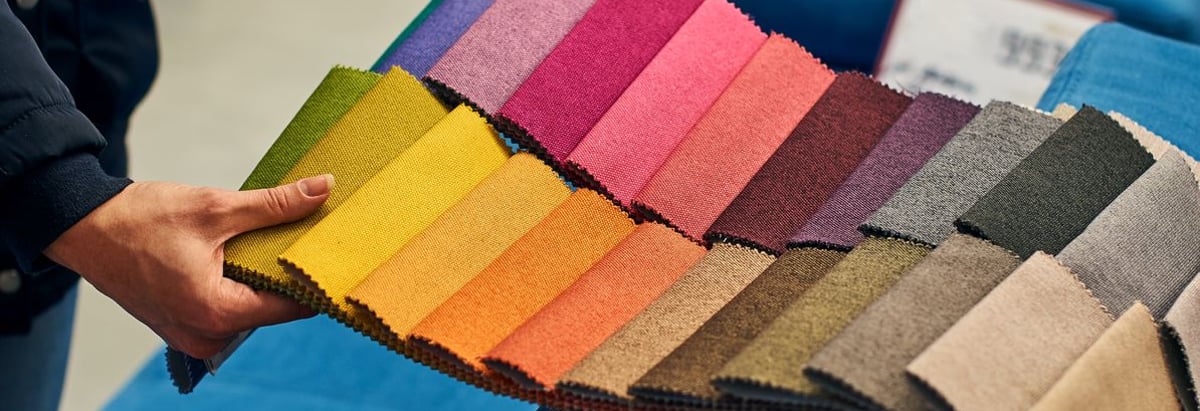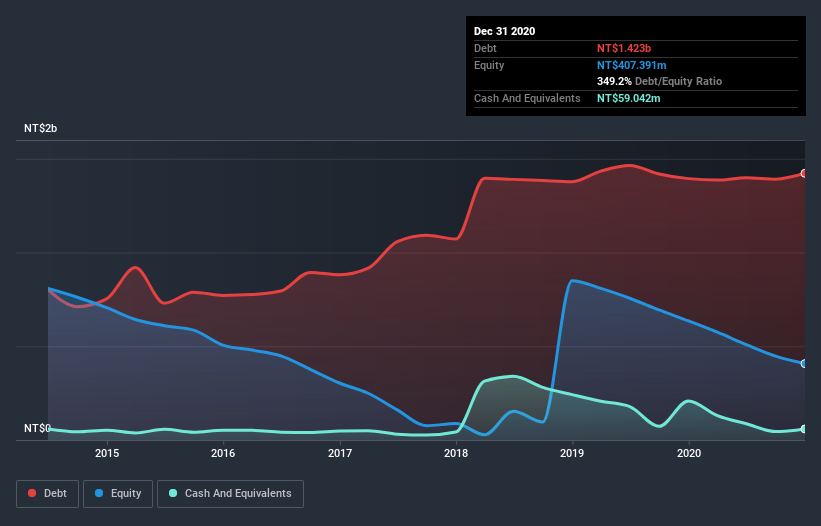Is Tong-Hwa Synthetic Fiber (TPE:1418) Using Debt In A Risky Way?

Howard Marks put it nicely when he said that, rather than worrying about share price volatility, 'The possibility of permanent loss is the risk I worry about... and every practical investor I know worries about.' So it seems the smart money knows that debt - which is usually involved in bankruptcies - is a very important factor, when you assess how risky a company is. We note that Tong-Hwa Synthetic Fiber Company Limited (TPE:1418) does have debt on its balance sheet. But the more important question is: how much risk is that debt creating?
When Is Debt Dangerous?
Debt is a tool to help businesses grow, but if a business is incapable of paying off its lenders, then it exists at their mercy. Ultimately, if the company can't fulfill its legal obligations to repay debt, shareholders could walk away with nothing. However, a more common (but still painful) scenario is that it has to raise new equity capital at a low price, thus permanently diluting shareholders. By replacing dilution, though, debt can be an extremely good tool for businesses that need capital to invest in growth at high rates of return. When we examine debt levels, we first consider both cash and debt levels, together.
View our latest analysis for Tong-Hwa Synthetic Fiber
How Much Debt Does Tong-Hwa Synthetic Fiber Carry?
The chart below, which you can click on for greater detail, shows that Tong-Hwa Synthetic Fiber had NT$1.42b in debt in December 2020; about the same as the year before. However, because it has a cash reserve of NT$59.0m, its net debt is less, at about NT$1.36b.

How Strong Is Tong-Hwa Synthetic Fiber's Balance Sheet?
We can see from the most recent balance sheet that Tong-Hwa Synthetic Fiber had liabilities of NT$121.6m falling due within a year, and liabilities of NT$1.70b due beyond that. On the other hand, it had cash of NT$59.0m and NT$2.03m worth of receivables due within a year. So its liabilities total NT$1.76b more than the combination of its cash and short-term receivables.
The deficiency here weighs heavily on the NT$384.4m company itself, as if a child were struggling under the weight of an enormous back-pack full of books, his sports gear, and a trumpet. So we'd watch its balance sheet closely, without a doubt. After all, Tong-Hwa Synthetic Fiber would likely require a major re-capitalisation if it had to pay its creditors today. The balance sheet is clearly the area to focus on when you are analysing debt. But it is Tong-Hwa Synthetic Fiber's earnings that will influence how the balance sheet holds up in the future. So if you're keen to discover more about its earnings, it might be worth checking out this graph of its long term earnings trend.
In the last year Tong-Hwa Synthetic Fiber had a loss before interest and tax, and actually shrunk its revenue by 53%, to NT$100m. That makes us nervous, to say the least.
Caveat Emptor
Not only did Tong-Hwa Synthetic Fiber's revenue slip over the last twelve months, but it also produced negative earnings before interest and tax (EBIT). Its EBIT loss was a whopping NT$273m. Combining this information with the significant liabilities we already touched on makes us very hesitant about this stock, to say the least. That said, it is possible that the company will turn its fortunes around. But we think that is unlikely, given it is low on liquid assets, and burned through NT$177m in the last year. So we think this stock is risky, like walking through a dirty dog park with a mask on. When analysing debt levels, the balance sheet is the obvious place to start. But ultimately, every company can contain risks that exist outside of the balance sheet. Case in point: We've spotted 4 warning signs for Tong-Hwa Synthetic Fiber you should be aware of, and 2 of them are potentially serious.
If you're interested in investing in businesses that can grow profits without the burden of debt, then check out this free list of growing businesses that have net cash on the balance sheet.
If you decide to trade Tong-Hwa Synthetic Fiber, use the lowest-cost* platform that is rated #1 Overall by Barron’s, Interactive Brokers. Trade stocks, options, futures, forex, bonds and funds on 135 markets, all from a single integrated account. Promoted
Valuation is complex, but we're here to simplify it.
Discover if TongHwa might be undervalued or overvalued with our detailed analysis, featuring fair value estimates, potential risks, dividends, insider trades, and its financial condition.
Access Free AnalysisThis article by Simply Wall St is general in nature. It does not constitute a recommendation to buy or sell any stock, and does not take account of your objectives, or your financial situation. We aim to bring you long-term focused analysis driven by fundamental data. Note that our analysis may not factor in the latest price-sensitive company announcements or qualitative material. Simply Wall St has no position in any stocks mentioned.
*Interactive Brokers Rated Lowest Cost Broker by StockBrokers.com Annual Online Review 2020
Have feedback on this article? Concerned about the content? Get in touch with us directly. Alternatively, email editorial-team (at) simplywallst.com.
About TWSE:1418
TongHwa
Manufactures and sells polyacrylonitrile synthetic fibers in the Republic of China.
Slight with questionable track record.
Similar Companies
Market Insights
Community Narratives




